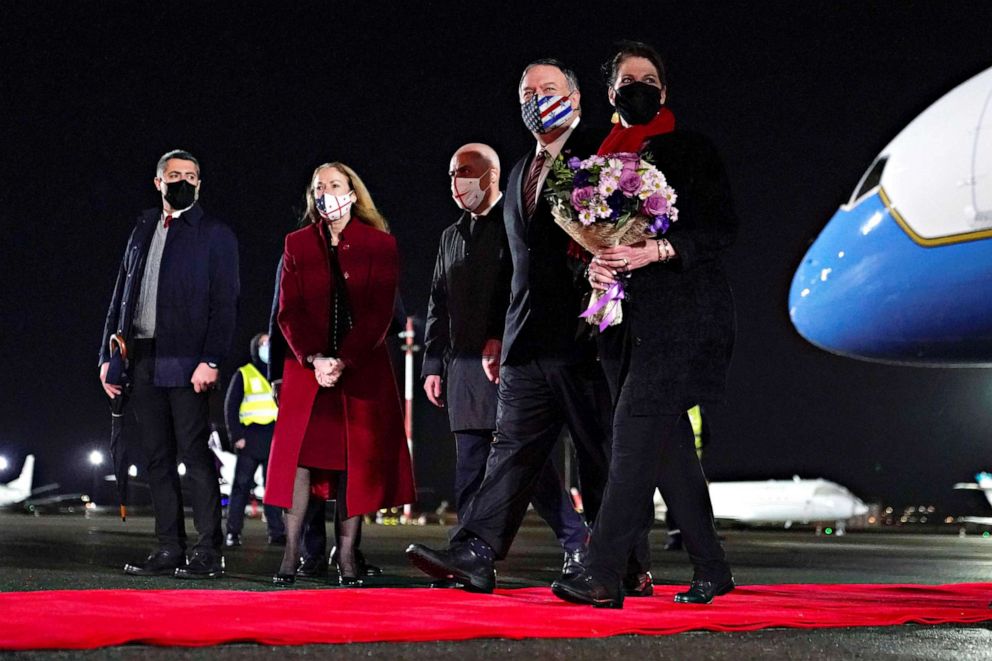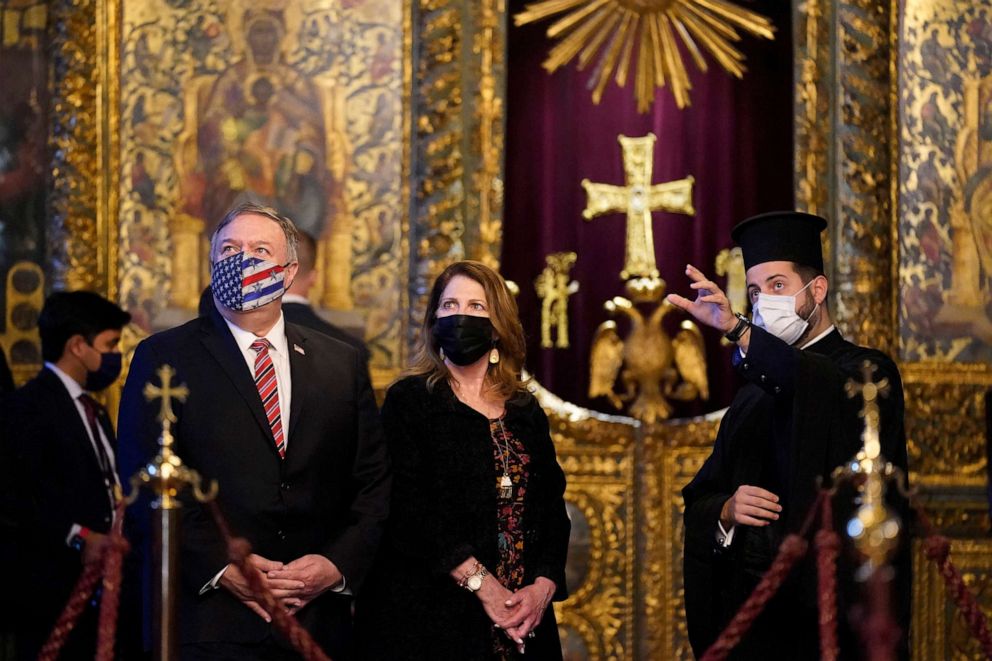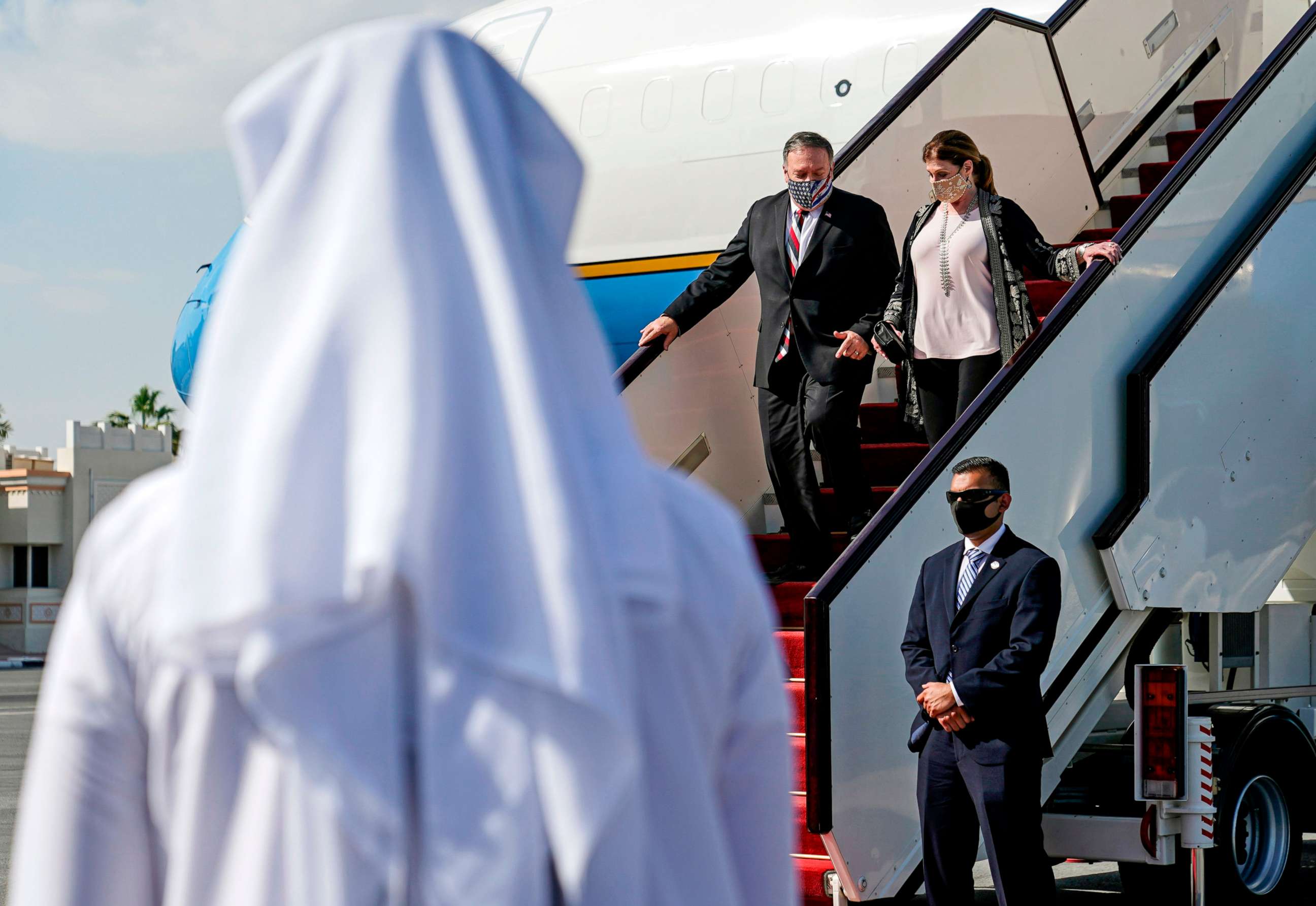Pompeo claims he's 'fully vindicated' for wife's travel, but watchdog finds fault with documentation
The top U.S. diplomat has been battling with the department's inspector general.
Secretary of State Mike Pompeo is claiming that he and his wife Susan have been "fully vindicated" after a watchdog investigation of her travel on his official trips. But according to the report, that's not what the Office of Inspector General found.
After a year-long probe, the OIG said that the department lacked documentation that Susan Pompeo's presence was properly authorized on most of the trips she's made during Pompeo's time as the top U.S. diplomat.
The final report's release was preempted by a State Department statement Thursday, saying, "There was no wrongdoing by the Secretary of State, his spouse or family, or the State Department. The OIG wasted both time and taxpayer resources on this report."
The preemptive strike escalates a battle Pompeo has waged against the OIG, which has been rocked by leadership changes and his frequent attacks. In May, Pompeo had recommended that President Donald Trump fire Steve Linick, the career official leading the watchdog agency, and since his ouster, there have been three different acting inspectors general.
The fourth, career diplomat Matthew Klimow, departed his post Friday, the OIG confirmed to ABC News. Klimow was expected to leave by the "end of 2020," a State Department spokesperson said when he was appointed in September, but his departure, a couple weeks shy of 2021 and a couple months shy of his maximum time under the Vacancies Act, caught some by surprise.
Critics, particularly Democratic lawmakers, have accused Pompeo of trying to stamp out oversight of his tenure at the agency.
In its latest report, the OIG itself suggested that Pompeo's team "fundamentally misunderstands the independent role of OIG and our statutory oversight responsibilities."

Susan Pompeo has traveled with her husband on 11 official trips -- where her presence was deemed essential for "representational purposes" -- although the report only covers the first eight prior to April 2020. The "official" designation means that the Pompeos do not have to reimburse the federal government for her travel and that she was given support staff at no personal cost either.
The OIG did not investigate whether her travel was justified, it only focused on whether proper procedures were followed to authorize it.
Despite that limited scope, Pompeo claimed full exoneration Thursday, saying, "There was no violation of any law or statute; There was no violation of any regulation; and There was no violation of any provision of the Foreign Affairs Manual policy."
But the OIG specifically said in its report that's not what it found: "(T)he Department reads into OIG's report a conclusion that OIG does not make -- namely, that the Department's use of funds on the trips reviewed by OIG did not violate any law, regulation, or FAM provision. The report, however, does not reach this conclusion," it said.

The OIG told ABC News it had no comment beyond the report. It provided the State Department and Congress its report this week, releasing it publicly late Thursday. Politico first reported on the report, which was also obtained by ABC News hours before its release.
While the State Department provided the OIG with justifications for each trip, it had no record of an official authorizing Susan Pompeo's travel on six out of eight trips, according to the OIG.
"The Department provided documentation supporting the purpose of each trip but could not provide documentation demonstrating approval of each trip, bringing into question whether the trips were, in fact, authorized," the report said.
Of the eight trips, the OIG found "only two instances in which an authorizing official provided and signed a justification statement documenting the justification for Mrs. Pompeo's travel." That official cannot be Pompeo himself because department officials can't take "official actions" that would affect them personally or financially.
In the six other trips, the secretary's office provided documents justifying Susan Pompeo's travel, but not any formal approval internally.
Instead, Brian Bulatao, the under secretary for management and a longtime Pompeo friend, told the OIG he verbally approved four of those six trips, while the other two were prior to his tenure starting at the State Department. But OIG said "he could not provide any documentation evidencing that he had done so," and "there was no documentation that the Office of the Legal Adviser or the relevant regional bureau were consulted about these trips."

In its response to the OIG, included in the report, State Department counselor Ulrich Brechbuhl said the department did not need to provide any proof of authorization.
"The governing statute authorizing such travel does not require this type of documentation; there is no regulation requiring this type of documentation; and there is no governing FAM provision requiring this type of documentation," wrote Brechbuhl, who like Bulatao, is a longtime Pompeo friend, West Point classmate and former business partner.
The FAM is the Foreign Affairs Manual, the department's book of guidelines, which says that officials are "expected to make sparing and judicious use of this authorization" for "official" family travel and must show a "clear advantage to the United States." But the provisions "appear to be drafted to cover travel by family members of Foreign Service officers," not the secretary him or herself, the OIG said.
While that may clear Pompeo, the OIG also said that "federal agencies generally may not pay travel and subsistence expenses for the spouses of employees who accompany them on official travel except when such travel expenses are specifically authorized by law," citing the U.S. Comptroller General.
In a robust defense of Pompeo, Brechbuhl goes on to attack the OIG, accusing it of helping "partisan actors ... torture, twist and contort the report to imply that the Secretary and Department somehow did something improper." Instead of publishing a public report, he said the watchdog should have come to the secretary's team to discuss these issues privately and find a resolution.
That suggestion "fundamentally misunderstands the independent role of OIG and our statutory oversight responsibilities," the OIG said.
Klimow, who had recused himself from the travel probe, will return to his post as U.S. ambassador to Turkmenistan and be succeeded by Diana Shaw, a career civil servant who has served as deputy inspector general and previously led the watchdog agency in August in between Klimow and acting IG Stephen Akard.
It's not the first time Pompeo and his team have accused the federal watchdog of political aims. Linick was repeatedly trashed by Pompeo, Bulatao, and others, accused of leaking or investigating topics that weren't relevant.
The OIG is investigating Pompeo's use of staff to run personal errands for himself and his wife. In August, it concluded a report on Pompeo's use of an emergency authority to bypass Congress and sell $8 billion of arms to Saudi Arabia and the United Arab Emirates -- finding that Pompeo acted within his statutory authority, but failed to properly consider civilian casualties.
The watchdog has also been working on a report about misconduct in the Office of the Chief of Protocol, which has not yet been released amid a fight with the department about its findings.




